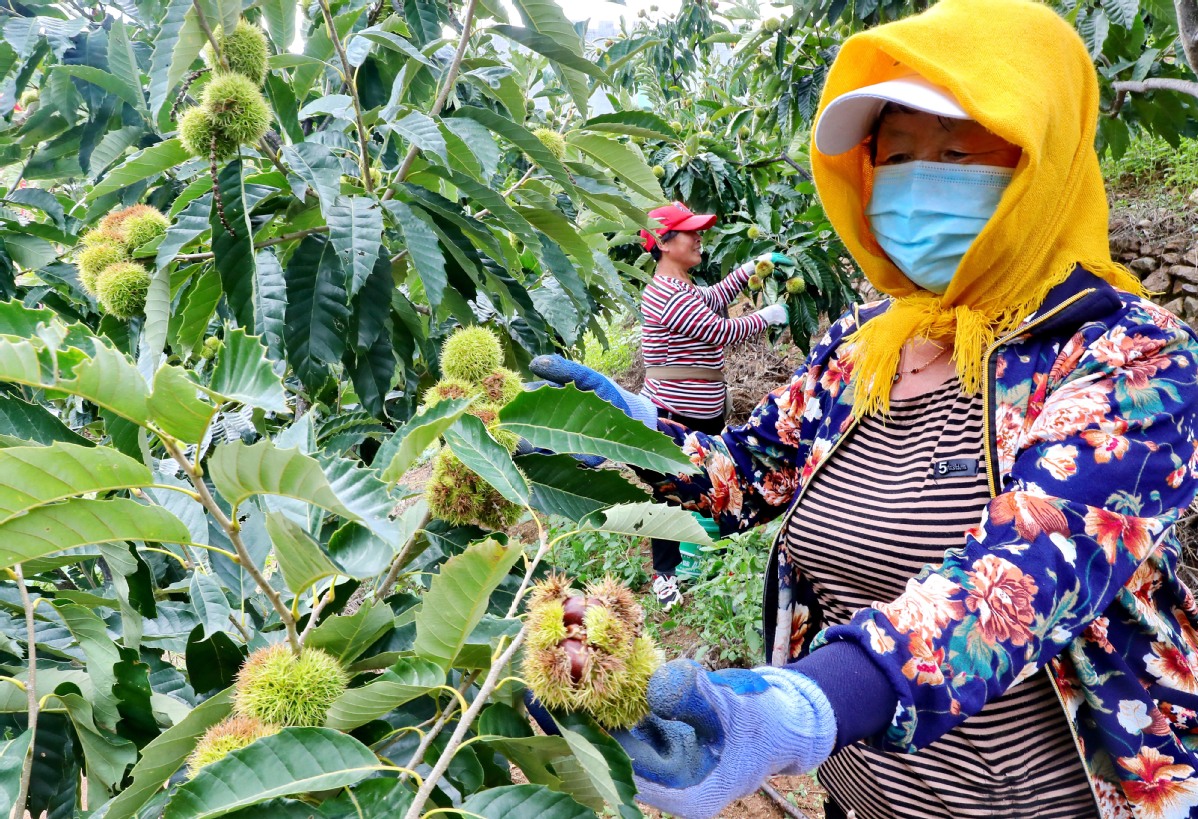Beijing suburb a hotbed for chestnut growing


At the foot of the Great Wall approximately 80 kilometers north of downtown Beijing, the land is thick with sweet chestnut trees, some of them hundreds of years old.
Five weeks from now, the farmers will gather the nuts and sell them to cooperatives. In this way, they are ensured better prices than on the open market.
Finding a good price is important for the chestnut growers, who have been hit by serious price fluctuations in the past.
Zhang Fugui, a local chestnut grower, said sometimes the growers sold the chestnuts for 16 yuan ($2.23) per kilogram, but at other times they had to sell them for as little as 6 yuan per kg.
Last year, chestnuts accounted for 93 percent of the total output of dried and fresh fruits in Bohai township in Huairou district, Beijing, according to a statistical yearbook.
The altitude, sunlight and soil conditions make the area suitable for growing quality chestnuts. There has been large scale cultivation of the nuts in the area since the Ming Dynasty (1368-1644), local agricultural technicians said.
Zhang, 61, tends his own trees, but he also works at a cooperative, earning a monthly income of roughly 5,000 yuan.
Managing quality
Li Yongjun, the 64-year-old founder of the cooperative, comes from a family that has grown chestnuts for generations. Before starting the cooperative in 2008, he had grown wheat, rice and other crops. He also worked as a chestnut trader and even ran a printing factory.
On his motivations for starting the cooperative, he said, "I believed there was something I could do for my hometown."
He started by conducting research on the chestnut market and related technology, both at home and abroad. He decided that establishing a processing cooperative would help growers gain better control over the prices of the nuts.
So far, the cooperative has signed contracts with over 800 chestnut-growing households. Each year, it purchases 2,000 to 3,000 metric tons of chestnuts from them, said Li, adding that, before the COVID-19 pandemic, they were selling to customers in countries including Japan, Singapore and Israel.
According to Li, home-based growing can lead to wide variations in output, ranging from hundreds to thousands of kilograms per household. One solution is for the cooperative to rent the land and take over the production process, thus boosting both the quality and quantity of chestnuts, he said.
In recent years, the cooperative has begun to lease land from local growers at an annual rate of 15,000 yuan per hectare, according to Zhang.
He is ready to transfer his family's land rights to the cooperative. "It is time for me to retire as a chestnut grower. And my daughters have no intention to tend the trees, so it is the best choice for my family to accept the proposal," he said.
Young people returning
Zhang's daughters are not the only young people to leave the area in search of new careers and lives. However, in recent years, an increasing number have returned to take part in the chestnut industry. Many of them have brought new ideas with them.
Li Yongjun's son, Li Sipeng, is one of the returnees. Despite studying music, in 2017, the younger Li joined his father and started his own adventure in the chestnut industry.
The 28-year-old man works with specialists from the Beijing Academy of Agriculture and Forestry Sciences, promoting standardized management and technology related to seed selection and nutrition.
He is more tech savvy than his father. Riding the rising wave of livestreaming, he has brought local chestnut products to some of the most popular webcast studios in China.
His best sales experience was in a webcast session hosted by Li Jiaqi, one of the top livestreamers in China. In a single night, Li Sipeng sold 3 million yuan of processed products.
Yet the young man said he sees livestreaming more as an opportunity to pitch local nuts to a wider audience, rather than just a sales platform.
"We told audiences how we tend our trees and how the nuts are processed," he said.
For him, there is great untapped potential in this ancient form of cultivation, with its long history and culture.
Father and son plan to open an afternoon tea shop at the foot of the Great Wall, and a visitor center where tourists can wander among the trees and observe this age-old tradition in action.
- Rainstorms leave 8 dead, 18 missing in North China county
- Swiss bloggers: 100 yuan shopping spree at Dounan Flower Market
- CPC plenum to focus on next five-year plan
- China launches sixth batch of internet satellites
- China trains over 1,600 peacekeepers from 70 countries
- National conference calls for decisive measures to fight Chikungunya fever





































